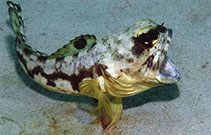| Family: |
Opistognathidae (Jawfishes) |
| Max. size: |
28 cm TL (male/unsexed) |
| Environment: |
reef-associated; marine; depth range 2 - 40 m |
| Distribution: |
Western Central Pacific: the Philippines, Malaysia and Indonesia. |
| Diagnosis: |
Dorsal spines (total): 10-11; Dorsal soft rays (total): 13-14; Anal spines: 2-2; Anal soft rays: 11-13; Vertebrae: 26-27. This species is distinguished by the following characters: a rigid upper jaw lacking flexible lamina posteriorly, extending about 0.6-0.9 eye diameters behind posterior margin of orbit; infraorbitals are relatively slender and tubular, the third infraorbital with moderate lateral opening and wide suborbital shelf; D X-XI,13-14; A II,11-13; scale rows in horizontal series 66-95; vertebrae 10-11 (usually 11) + 16-17. Colouration: dorsum with 6-7 dark blotches along base of dorsal fin, sides with a double row of large pale spots, and spinous dorsal fin with a single black spot between spines 3 to 5-7 (Ref. 128653). |
| Biology: |
Mouthbrooders. Eggs which are clumped together in a sticky ball get incubated inside the parent's mouth (Ref. 40511). |
| IUCN Red List Status: |
Not Evaluated (N.E.) Ref. (130435)
|
| Threat to humans: |
harmless |
Source and more info: www.fishbase.org. For personal, classroom, and other internal use only. Not for publication.

